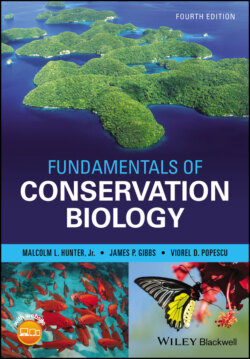Читать книгу Fundamentals of Conservation Biology - Malcolm L. Hunter Jr. - Страница 25
Summary
ОглавлениеPeople who care about nature and the natural resources we obtain from nature, such as clean air and clean water, come with many labels: conservationists and preservationists, environmentalists and ecologists. Although these people share many goals, their priorities can differ. For example, conservationists advocate the careful use of natural resources, whereas environmentalists often emphasize maintaining an uncontaminated environment. The history of conservation has a recurring theme: people being forced to limit their use of natural resources more and more as human populations grow and technological sophistication increases. Conservation history is marked by practices and laws regulating our use of natural resources, but more fundamental is the evolution of our ethical attitudes toward nature and its intrinsic and instrumental values. Three ethical positions underpin our motivation and practices to conserve biodiversity: (1) the Romantic‐Transcendental Preservation Ethic (briefly, nature is best used for spiritual purposes); (2) the Resource Conservation Ethic (nature is natural resources to be carefully developed for human purposes); and (3) the Evolutionary‐Ecological Land Ethic (people are part of nature and have both the right to change it and a responsibility for respecting the intrinsic value of other species and ecosystems in general). Conservation biology is the applied science of maintaining the Earth’s biological diversity. It differs from basic biologic sciences because it reaches out to economics, law, education, politics, philosophy, and other subjects that shape the human world within which conservation must operate. It differs from traditional natural resource sciences because it places relatively greater emphasis on all forms of life and their intrinsic value, compared with other natural resource sciences, which typically focus on relatively few species with high instrumental (usually economic) value.
